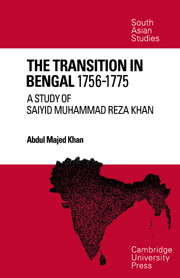Book contents
- Frontmatter
- Contents
- Map of the Mughal Subah of Bengal, Bihar and Orissa in the eighteenth century
- Preface
- List of Company servants with their Mughal titles
- List of abbreviations
- 1 Introduction: the twilight of Mughal Bengal
- 2 The early life of Reza Khan and his first public office in 1756
- 3 The involvement in politics, 1760–1763
- 4 The Naibat at Dacca, 1763–1765
- 5 The Naibat Subahdari at Murshidabad, 1765
- 6 Reza Khan at the zenith of his power, 1765–1767
- 7 The early reverses, 1767–1768
- 8 Conflict of interests: opposition to trade monopolies and proposal for supervisorships, 1769
- 9 The conflict deepens, 1769–1770
- 10 The rearguard action and Reza Khan's arrest, 1770–1772
- 11 The ‘Inquisition’, 1772–1775
- Select bibliography
- Index
- Plate section
1 - Introduction: the twilight of Mughal Bengal
Published online by Cambridge University Press: 29 October 2009
- Frontmatter
- Contents
- Map of the Mughal Subah of Bengal, Bihar and Orissa in the eighteenth century
- Preface
- List of Company servants with their Mughal titles
- List of abbreviations
- 1 Introduction: the twilight of Mughal Bengal
- 2 The early life of Reza Khan and his first public office in 1756
- 3 The involvement in politics, 1760–1763
- 4 The Naibat at Dacca, 1763–1765
- 5 The Naibat Subahdari at Murshidabad, 1765
- 6 Reza Khan at the zenith of his power, 1765–1767
- 7 The early reverses, 1767–1768
- 8 Conflict of interests: opposition to trade monopolies and proposal for supervisorships, 1769
- 9 The conflict deepens, 1769–1770
- 10 The rearguard action and Reza Khan's arrest, 1770–1772
- 11 The ‘Inquisition’, 1772–1775
- Select bibliography
- Index
- Plate section
Summary
In a public letter of 25 November 1791 the government of Lord Cornwallis reported from Calcutta to the Directors of the East India Company in London,
We are much concerned to advise you of the decease of the Nabob Mahomed Reza Khan…
His honourable character, his regard to the English for a long period of time, and the services he had rendered in Bengal are testified upon the records of this Government and well known to the Company in England. His public and private worth equally made him an object of esteem, and they entitle his memory to respect.
Such was the obituary notice of a man who had been a vital part of Bengal's history for over thirty years and witness to its history for nearly half a century. He had observed the irremediable decline of two empires, that of the Safavids in the land of his birth, Iran, and that of the Mughals in India, the land of his adoption. He had participated in the events which led to the eclipse of the Nawabs and to the rise of the English East India Company in Bengal. He had been the agent of the Company, the defender of the Nizamat, and had been a leading figure throughout what may be called the Anglo-Mughal phase in Bengal's history. That phase was brought to an end on 1 January 1791 with Cornwallis's abolition of the office of Naib Nazim and the final transfer of the Sadar Nizamat Adalat. Nine months later, having worked almost to the end upon cases which had been awaiting his decision before Cornwallis's regulations were passed, Reza Khan died.
- Type
- Chapter
- Information
- The Transition in Bengal, 1756–75A Study of Saiyid Muhammad Reza Khan, pp. 1 - 16Publisher: Cambridge University PressPrint publication year: 1969



